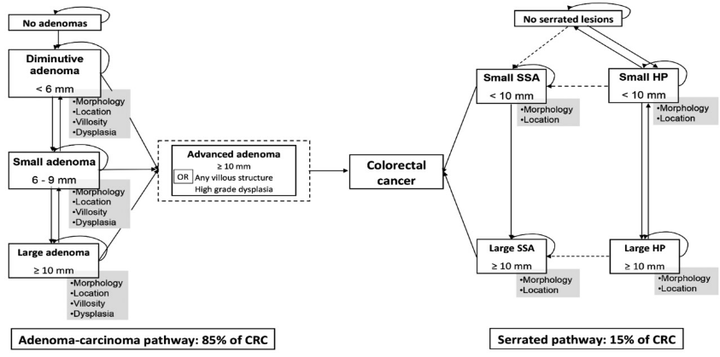The ASCCA model
The Adenoma and Serrated pathway to Colorectal CAncer (ASCCA) model describes the development of colorectal polyps to CRC. It takes both the adenoma-carcinoma and the serrated pathway to CRC into account. The model satisfactorily reproduces the Dutch age- and sex-specific polyp prevalence as reported in a Dutch trial and Dutch CRC incidence and mortality rates. In addition, it is externally validated against international screening trials with long-term follow-up.

Long-term impact of the Dutch CRC screening program
Since 2014, the Netherlands has implemented a colorectal cancer (CRC) screening programme consisting of biennial faecal immunochemical testing (FIT) screening in individuals aged 55 to 75 years. We aimed to evaluate the long-term impact of this programme on CRC incidence, mortality and colonoscopy demand. Using the ASCCA model, we showed that the Dutch CRC screening programme will decrease CRC incidence by roughly 35% and CRC mortality by roughly 45%. To achieve this reduction, 110,000 colonoscopies will be required annually by 2044. However, the number of yearly incident CRC cases after thirty years of screening will be comparable to that before the implementation of screening, due to ageing of the population. This indicates that facilities for CRC patients need to be maintained at the same level. Furthermore, results of this study are informative for steering colonoscopy capacity to meet the expected demand.
Potential improvements to the CRC screening programme
With the ASCCA model, several potential improvements to the Dutch CRC screening programme has been evaluated. For example, we assessed the potential of an alternative stool test, namely the multi-target FIT (mtFIT), that has higher diagnostic accuracy of precursor lesions than FIT. We found that mtFIT-based screening compared to FIT-based screening was predicted to reduce CRC incidence and mortality by at least 5% and 4%, respectively, at feasible costs. Thus, mtFIT holds potential to achieve additional and clinically meaningful long-term CRC incidence and CRC-related mortality reductions in programmatic CRC screening.
Impact of the COVID-19 pandemic on CRC burden
The COVID-19 pandemic has disrupted organised CRC screening programmes worldwide. In the Netherlands, the CRC screening programme was completely suspended, while in other countries significant decreases in participation and diagnostic follow-up were observed. With an international consortium, we evaluated how these disruptions affected the burden of CRC and looked at ways to restart the screening programme. Our studies showed that it is crucial to get people back to screening as soon as possible. By inviting individuals who missed screening during the pandemic again, the impact of the disruption could be minimised. Moreover, we found that increasing the FIT threshold and giving more time for catching up with missed screenings can help to reduce the impact of the disruption, especially when healthcare resources are limited.
Key publications
- Wisse PHA et al. The multitarget faecal immunochemical test for improving stool-based colorectal cancer screening programmes: a Dutch population-based, paired-design, intervention study. Lancet Oncol. 2024. PMID: 38346438.
- Yebyo HG et al. Benefit-harm analysis for informed decision making on participating in colorectal cancer screening: a modelling study. Value Health. 2023. PMID: 38141815.
- van Wifferen F et al. Prioritisation of colonoscopy services in colorectal cancer screening programmes to minimise impact of COVID-19 pandemic on predicted cancer burden: A comparative modelling study. J Med Screen. 2022. PMID: 35100894.
- Lew JB et al. Validation of Microsimulation Models against Alternative Model Predictions and Long-Term Colorectal Cancer Incidence and Mortality Outcomes of Randomized Controlled Trials. Med Decis Making. 2020. PMID: 32845232.
- Greuter MJE et al. Screening for Colorectal Cancer With Fecal Immunochemical Testing With and Without Postpolypectomy Surveillance Colonoscopy: A Cost-Effectiveness Analysis. Ann Intern Med. 2017. PMID: 28973514.
- Greuter MJE et al. Long-term Impact of the Dutch Colorectal Cancer Screening Programme on Cancer Incidence and Mortality – Model-based Exploration of the Serrated Pathway. Cancer Epidemiol Biomarkers Prev. 2015. PMID: 26598535.
- Greuter MJE al. Modeling the Adenoma and Serrated pathway to Colorectal CAncer (ASCCA). Risk Anal. 2014. PMID: 24172539.